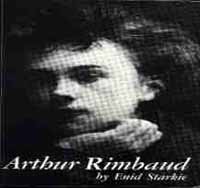From
'A Season in Hell, Ravings I, Foolish Virgin, The Infernal
Bridegroom'.
From a book of Collected Poems by Oliver Bernard. This poem is about
Verlaine, but Rimbaud wrote it!
Voice-over Verlaine, to open the story in Total Eclipse:
he speaks of Rimbaud.....
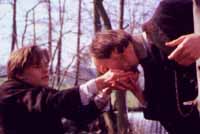 'Sometimes he speaks
in a kind of tender dialect. 'Sometimes he speaks
in a kind of tender dialect.
Of the death which causes
repentance,
of the unhappy man who certainly exists;
of painful
tasks and heart rendering departures.
In the hovels where we got drunk, he wept,
looking at those who
surrounded us; the cattle of poverty.
He lifted up drunks in the black
streets.
He had the pity a bad mother has for small children.
He
moved with the grace of a little girl at chatechism,
he pretended to
know about everything;
business, art, medicine. I followed him, I had
to.'
My love for TBO's portrayal of the character Arthur
Rimbaud in Total Eclipse, has inspired me, and many loyal DiCaprio
admirers to delve a little deeper into Rimbaud's life and works. Through
my friend, Annabelle, who kept me up to date with a writer named "Enid
Starkie" and her insightful book about Rimbaud, I have decided to share
some of what we have learned about this long ago genius.
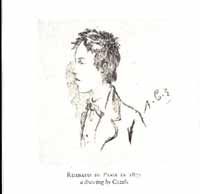 For starters, only one
third of Rimbaud's work has been found. They use the word 'Rimbaudisms' in
the book. Certain words were invented by Rimbaud and Verlaine in their
conversations with each other. These "Rimbaldism-slogans" were used by the
students involved in the Student Revolution of 1968 in Paris! For starters, only one
third of Rimbaud's work has been found. They use the word 'Rimbaudisms' in
the book. Certain words were invented by Rimbaud and Verlaine in their
conversations with each other. These "Rimbaldism-slogans" were used by the
students involved in the Student Revolution of 1968 in Paris!
Expressions like 'angel' and 'devil' come up frequently when people
(who knew him) talk about Rimbaud, and isn't that exactly how Leonardo
brought him to life?
Rimbaud actually said: "O Verlaine.....Verlaine.." when he came
back to Roche after the shooting, when Verlaine ended up in prison.
Verlaine, who only went along with Rimbaud on his road of life for a
short distance, knew him, loved him, and understood him.
He considered
his 2 years of imprisonment as a 'holy task', he was preparing the
publication of 'Poetes Maudits' (1884)and later of 'Les Illuminations'
(1886).
About his poetry:
Rimbaud succeeded, with astonishing certainty of
touch, in adopting and making his own the technique and the methods of
composition of the masters of his day, and in so doing he learned his
trade.
An explanation for his frequent use of 'bad language' in poems and in
his speach:
Later it will become apparent that whenever Rimbaud was
subjected to any unusual strain this showed itself outwardly in the
coarseness of his speech or writing. Izambard used to say that after a
dispute with his mother, Arthur would become scatological in his
conversation, but never otherwise.
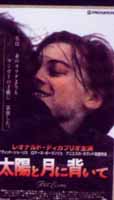 Before Rimbaud leaves for
Paris he writes to Izambard (his teacher). He ends the letter with: Before Rimbaud leaves for
Paris he writes to Izambard (his teacher). He ends the letter with:
... I enclose some verses of mine. Read them one morning in the sun,
as I wrote them. You are no longer for me a teacher - at least I hope not.
Good-bye and send me a letter of twenty-five pages, very quickly, poste
restante.
A. Rimbaud
PS..Very soon I shall give you some startling news of the kind of life
I'm going to lead after the summer holidays.
This is how he 'escaped':
On 28 August, three days after he wrote to
Izambard, he was walking with his mother and the two little sisters in the
meadows on the banks of the Meuse. Suddenly he left them saying that he
wished to go home to fetch a book to read. It was not, however, home that
he went, but to the station, and boarded the first train leaving for
Paris. He's fifteen at the time and very childish and puerile....
He boarded the train without a penny in his pockets and set off thus
for Paris.
 It is easy to picture his
wretched mother's anxiety and distress when she arrived home and found
that her son had not reached the house, and, like every monther in similar
circumstances, she imagined all manner of hideous possibilities. It is easy to picture his
wretched mother's anxiety and distress when she arrived home and found
that her son had not reached the house, and, like every monther in similar
circumstances, she imagined all manner of hideous possibilities.
Nothing was heard of him until his spirit was broken and all his
courage had ebbed away.
He than wrote to Izambard:
Cher monsieur: What you advised me not to do I did, I left home and
came to Paris.
I love you as a brother, and I'll love you as a
father.
Your poor Rimbaud
PS...And if you come to Mazas (where Arthur is imprisoned because he
didn't have money to pay the trainticket!), you'll take me back with you
to Douai, won't you? (He just doesn't want to go back to his
mother..)
Izambard comes to the prison and pays the debt and takes
Rimbaud with him.
A few days later Rimbaud arrived at Douai, somewhat humiliated and
shamefaced, but happy nevertheless, to have got out of his scrape so
easily. He gave a lurid and highly coloured account of his adventures, his
arrest, his cross examination, the disinfecting of his clothes on his
arrival at the prison, and the terror he had felt when he had been locked
into his cell. Now that everything was over, he enjoyed recounting his
experiences and found therein outlet for his descriptive talent. It is
said that the poem, 'Les chercheuses de Poux' (the lice seekers), composed
in Paris the following year, refers to the ministrations of Izambard's
'aunts' when they cleaned his hair of the lice acquired in prison.
But his mother writes a letter to Izambard and Rimbaud has to go back
to Charleville.
Nothing could raise Rimbaud's spirits during the long and tedious
journey from Douai to Charleville. Terrified at the prospect of the
reception that was awaiting him at home, he sat huddled up in the corner
of the carriage and did not open his lips.
After dispatching his business Izambard left Charleville for some days.
He found, however, on his return in the first week in October, a letter
from Madame Rimbaud begging him to come to her aid once more as she was at
her wits' end with anxiety. Arthur had run away again and she had no idea
where he could have gone.
Rimbaud goes to Charleroi, then on foot to Brussels, and then back to
Douai.....
Izambard found him there after looking for him in Charleroi
and Brussels. He found him sitting in the parlour in the midst of the
aunts, quietly copying out his poems, with the neat writing and scrupulous
care of the model pupil. He was clean and tidy and looked so supremely
happy that Izambard had not the heart to scold him as he deserved,
especially as the aunts were obviously pleased to have him to look after
and to spoil.
 The poems of this period
show a happy innocence and a purity that he never again recaptured. The poems of this period
show a happy innocence and a purity that he never again recaptured.
But he has to go once again: When he saw that his master had come and
that it was really time to go he said good bye to the aunts and promised
them faithfully that he would be good. They had grown very fond of him and
did not like to see him leave, for they had not found him difficult or
troublesome, on the contrary; with kindness and affection, he became once
more the good little boy he had been in the past who asked for nothing but
love and understanding.
On the way to the police station Izambard, out of his deep affection,
spoke to him seriously of his concern for his future, of the fame that
could await him, if he did not spoil his chances of all that he hoped from
him. As he spoke he could not keep the emotion from appearing in his voice
and it seemed to him that Arthur understood and was touched. But he could
never know with Rimbaud, for the boy was always tongue-tied and awkward
whenever he was stirred to feeling. Then Izambard handed him over to the
care of the police sergeant and that was the last time he ever saw
him.
Shortly after he reached home Rimbaud wrote to him:
 Monsieur, for you
alone this. I came back to Charleville the day after I left you. My mother
received me and I am here completely idle. It seems that she won't put me
to school as a boarder until Jan 1871. Well! I've kept my promise. But I'm
dying and deliquescing in the dullness, in the drabness, and in the
foulness around me. Monsieur, for you
alone this. I came back to Charleville the day after I left you. My mother
received me and I am here completely idle. It seems that she won't put me
to school as a boarder until Jan 1871. Well! I've kept my promise. But I'm
dying and deliquescing in the dullness, in the drabness, and in the
foulness around me.
You see I still persist in loving liberty and a lot of things like
that. All very pitiable isn't it? I was going to run away to-day, and I
could have run away. I had new clothes and I would have sold my watch and
then long live liberty! But I stayed, I stayed. And yet I longed to run
away, many, many times. Here goes! With my hat, my coat, and my hands in
my pockets, I'm off. but I'll stay, damn it, I'll stay! I didn't promise
as much as that, but I'll do that to deserve your affection. you said that
to me and I'm going to deserve it. The gratitude I feel for you I can no
more express it to-day than I could the other day. But I'm going to prove
it to you. If it were only a question of doing something for you, I would
die to do it. I give you my word of honour. I have a lot of things to
say...
Your "heartless"
A. Rimbaud
When Izambard tells him he is leaving the school, Rimbaud is
desperate:
'What on earth shall I do when M. Izambard is gone? One
thing is absolutely certain and that is that I'll not be able to endure
this life for a whole year. I'll run away. I know how to write. I'll
become a journalist in Paris!'
And a friend asks: 'How will you
be able to fight your way alone?'
Rimbaud: 'Well! Then I'll fall
by the wayside! I'll die of hunger on a heap of stones, but I'll run
away!'
When Izambard leaves, Rimbaud is sunk in grief, the first passionate
grief of his life.
He was not yet sixteen, nevertheless this marked the end of his
school-days, for when the autumn came he had become another person and had
broken entirely with his old life.
At this state: his poetry had no positive faults, it showed remarkable
achievement, but there was nothing in it to give promise that he was to
become one of the most daringly original writers France has ever
possessed!
The more I read about him, the more interested I get. He must have had
a very strange life, very exuberant in the beginning and not very
interesting after he stopped writing poetry. It is so strange that he
wrote all these things 'in a kind of rage' (his sister Isabel's words) and
then just stopped writing. And he never bothered about his poems
anymore.....
The Cheated Heart
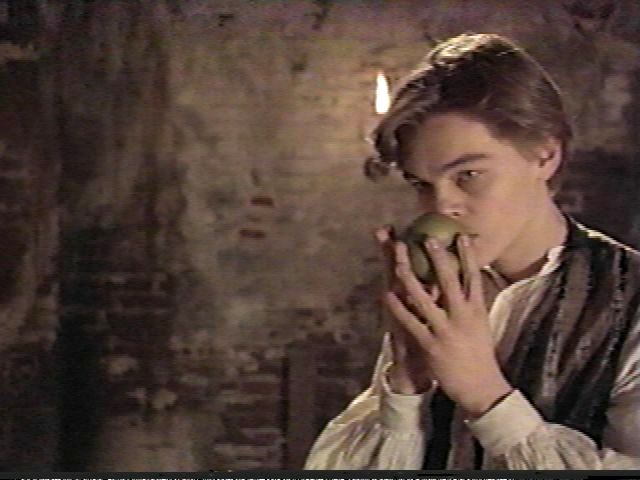 My poor heart dribbles at the stern, My poor heart dribbles at the stern,
my heart covered
with caporal:
they squirt upon it jets of soup,
my poor heart
dribbles at the stern:
under the jibes of the whole crew
which
bursts out in a single laugh,
my poor heart dribbles at the
stern,
my heart covered with caporal!
Ithyphallic, erkish, lewd,
their jibes have corrupted it!
In the wheelhouse you can see graffitti,
ithyphallic, erkish, lewd.
O abracadantic waves , take my heart that it
may be cleansed!
Ithyphallic, erkish, lewd, their jibes have corrupted
it!
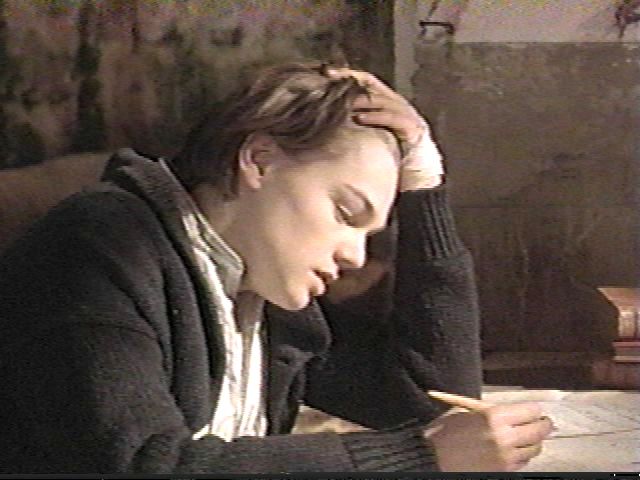 When they have finished chewing their quids, When they have finished chewing their quids,
what shall
we do, o cheated heart?
It will be bacchic hiccups then:
when they
have finished chewing their quids:
I shall have stomach heavings
then,
if I can swallow down my heart:
when they have finished
chewing their quids what shall we do,
o cheated heart?
May 1871
'Le Coeur Supplicie' - 'The Cheated
Heart'
Had the College de Charleville been able to open that autumn term
Arthur Rimbaud might have given up his bohemian ways and have settled down
to regular work. The war, however, was being continued and most of the
teachers of the school were either at the front or else acting as special
constables. The greater part of the pupils, moreover, came from the
district now occupied by the Prussians.
 For Arthur Rimbaud this
life of enforced idleness, with no fixed occupation, was disastrous. All
might have been well had he been able, as he wished, to enlist as a
soldier, but he still looked far younger than his sixteen years and he was
always turned down. In company with Delahaye he spent his days in long
country rambles, in interminable discussions on literature and especially
on politics. For Arthur Rimbaud this
life of enforced idleness, with no fixed occupation, was disastrous. All
might have been well had he been able, as he wished, to enlist as a
soldier, but he still looked far younger than his sixteen years and he was
always turned down. In company with Delahaye he spent his days in long
country rambles, in interminable discussions on literature and especially
on politics.
It was here, and at this time, that Rimbaud was fast gathering the
impressions that were to become later the substance of
'Illuminations'.
It is as if in the midst of the war and destruction
around him, he felt with a new intensity the extraordinary beauty of the
countryside which he had come to take for granted.
During this time he also read Verlaine's poems. And he added Verlaine
to his 'heroes'. Before ever meeting him, Rimbaud had learnt much from him
of the craft of poetry.
Even boys of Rimbaud's age were affected by the general spirit of
revolt symptomatic of the dissatisfaction which was suddenly to burst out,
not many months later, in the Commune. He was developing a hatred of all
government, of all authority, and this flame was fanned into activity by
his growing resentment of his mother's severe discipline. He would
willingly then have welcomed all form's of destruction, so long as
Charleville and the life he knew could be swept away to ruin.
 Mezieres, where Delahaye
lived, was bombarded on 20 December and the town caught fire. That day
Madame Rimbaud locked all her brood into the flat, allowing none of them
to venture forth in the streets for fear that she might lose one of them;
ever since Arthur's escapades she was in constant anxiety about them.
Delahaye and Rimbaud were now separated and Rimbaud suffered an agony of
suspense on his friend's behalf, since no news had come, except a vague
rumour that his house had been burnt to the ground and that the whole
family had perished in the flames. Mezieres, where Delahaye
lived, was bombarded on 20 December and the town caught fire. That day
Madame Rimbaud locked all her brood into the flat, allowing none of them
to venture forth in the streets for fear that she might lose one of them;
ever since Arthur's escapades she was in constant anxiety about them.
Delahaye and Rimbaud were now separated and Rimbaud suffered an agony of
suspense on his friend's behalf, since no news had come, except a vague
rumour that his house had been burnt to the ground and that the whole
family had perished in the flames.
However, a neighbour informed him that the whole family had been saved
and were being given hospitality by relations in the country. Rimbaud's
only concern was now to reach Delahaye, and to bring him some books to
occupy his time. In spite of the danger he made his way to the farm that
was sheltering the family, bringing with him as an offering his most
recent discovery, Baudelaire's translation of Poe's works and Le Petit
Chose of Daudet. He hid the emotion and anxiety he had felt on his
friend's behalf beneath an expression of gruff and hearty cheerfulness and
would not allow him to express his gratitude for the attentions he had
received. It was ever thus with Rimbaud. In him, as in his mother, emotion
rarely expressed itself in outward manifestations, and he was always
embarrassed when others sought to thank him or to show their appreciation.
Now the situation in Paris is getting tense.
The National Guard now began to give trouble and to organize the
revolt. On 29 January they attempted to set up a military dictatorship ,
but the authorities discovered the plot through their spies, and the
leaders were arrested and condemned to imprisonment.
News of the activities of the National Guard reachted the provinces and
it was then that Rimbaud decided to go once more to Paris, this time to
help in his country's fight for liberty. (,,,,) His desire to leave
Charleville was increased by the fact that, the school having reopened,
his mother is expecting him to resume his studies.
His friends return to school but:
 Rimbaud was scornful of
the action of his friends, declaring categorically that he would not
return to school, that there were other and more important things to do at
this crisis in the affairs of France He sold his watch and on 25 February
he left for Paris. Rimbaud was scornful of
the action of his friends, declaring categorically that he would not
return to school, that there were other and more important things to do at
this crisis in the affairs of France He sold his watch and on 25 February
he left for Paris.
Rimbaud had somewhere got hold of the name and address of Andre Gill,
the famous caricaturist, and with his habitual coolness, due to a complete
lack of knowledge and experience of worldly matters, he arrived unknown
and unannounced at the artist's studio. Gill was not then at home but the
door of his room was, as always, unlocked. Rimbaud entered and, being
tired after his journey, he lay down on the divan and was soon fast
asleep. It was thus that Gill found him on returning later. When he pushed
open his door, he stopped on the threshold and looked with amazement at
the huddled, untidy figure asleep on his couch. His first thought was that
it must be a burglar, then looking again he saw that it was only a child.
He shook the sleeping boy to awaken him and said, 'Who are you and what
are you doing here?'
Rimbaud sat up bewildered at having been suddenly
roused and answered, rubbing his eyes, that he was Arthur Rimbaud from
Charleville, a poet who had come to Paris to make his living. Gill was
touched by his extreme youth and his appearance of a lost child. He was
kind-hearted and gave him ten francs, all the money he had in his
possession that day, but told him that there was nothing in Paris for a
poet during these troubled times and advised him to go home to his
mother.......
 At a certain point
the National Guard was preparing Paris to resist the tyranny of the new
government: Things were beginning to look exciting in the capital and
then, for some unexplained reason, Rimbaud departed and returned to
Charleville. It is impossible to understand what it was that persuaded him
to leave the capital just then when the fight, which he had come to see
and to help, was reaching its critical stage. It is probable that some
startling experience shocked and terrified him, driving him home for
refuge. All through his life, much as he disliked home, Rimbaud always
returned there for shelter. At a certain point
the National Guard was preparing Paris to resist the tyranny of the new
government: Things were beginning to look exciting in the capital and
then, for some unexplained reason, Rimbaud departed and returned to
Charleville. It is impossible to understand what it was that persuaded him
to leave the capital just then when the fight, which he had come to see
and to help, was reaching its critical stage. It is probable that some
startling experience shocked and terrified him, driving him home for
refuge. All through his life, much as he disliked home, Rimbaud always
returned there for shelter.
Delahaye always said, and others have repeated it after him, though the
grounds for holding the opinion have never been stated, the 'The Cheated
Heart' which Rimbaud enclosed in a letter to Izambard on 13 May was
written after he returned from the Commune and that it is the account of
the treatment to which he had been subjected at the barracks of the Rue de
Babylone, when he is said to have been assaulted by the soldiers.
What
is certain is that the poem is the outcome of some very bitter and painful
experience which left an indelible mark on him.
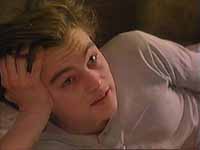 Up to now Rimbaud had
remained, in spite of his intellectual maturity, a child in experience,
who had been carefully sheltered from the ugly side of life. It is true
that like all imaginative children he had thought much about love and
passion, but only in a literary manner. It is quite obvious from the poems
he had written before April 1871 that he had as yet had no sexual
experience and singularly little sexual curiosity; even his imagination
had remained innocent and child-like. The only person ever to have stirred
his emotions was Izambard and his affection for his master was shy,
unexpressed and probably not fully realized by himself. At sixteen, when
he went to Paris, he still looked like a girl, with his small stature, his
fresh complexion and his reddish-gold wavy hair. It is probable that he
then received his first initiation into sex and in so brutal and
unexpected manner that he was startled and outraged, and that his whole
nature recoiled from it with fascinated disgust. But it was an experience
that did not leave him indifferent, nor his senses untouched. It was a
sudden and blinding revelation of what sex really was, of what it could do
to him, and it showed him how false had been all his imagined
emotions. Up to now Rimbaud had
remained, in spite of his intellectual maturity, a child in experience,
who had been carefully sheltered from the ugly side of life. It is true
that like all imaginative children he had thought much about love and
passion, but only in a literary manner. It is quite obvious from the poems
he had written before April 1871 that he had as yet had no sexual
experience and singularly little sexual curiosity; even his imagination
had remained innocent and child-like. The only person ever to have stirred
his emotions was Izambard and his affection for his master was shy,
unexpressed and probably not fully realized by himself. At sixteen, when
he went to Paris, he still looked like a girl, with his small stature, his
fresh complexion and his reddish-gold wavy hair. It is probable that he
then received his first initiation into sex and in so brutal and
unexpected manner that he was startled and outraged, and that his whole
nature recoiled from it with fascinated disgust. But it was an experience
that did not leave him indifferent, nor his senses untouched. It was a
sudden and blinding revelation of what sex really was, of what it could do
to him, and it showed him how false had been all his imagined
emotions.
He returned to Charleville a changed being, shattered and
enlightened by the experience through which he had gone, and he was never
the same again.
When Izambard got the letter with the poem he did not realize what had
been happening to his pupil; he did not understand the poem, nor how much
it had meant to Rimbaud.....
Izambard in replying to Rimbaud makes fun of the poem:
What is certain is that after this, Rimbaud shut himself away from
Izambard and made him no more confidences. The close friendship which had
been the deepest emotion of Rimbaud's boyhood was now at and end.
Le Voyou (meaning 'scoundrel' or 'raggamuffin')
Rimbaud returned home (from Paris) on 10 March in a state of
psychological turmoil and distress and this manifested itself outwardly in
the unruliness of his behaviour. He refused to wash any more and he
allowed his hair to grow until it hung in dirty, untidy ringlets over his
shoulders; he used to wander up and down the chief streets of Charleville
in the most crowded hour of the evening, the time of the 'aperitief', in
his dirty clothes, with his unkempt hair, his hands in his pockets (!),
smoking a short pipe and, what was considered most outrageous of all,
smoking it with its funnel pointing downwards!
In April the College the Charleville finally opened its doors in its
own building. Madame Rimbaud begged her son to return to his studies with
his friends, and again he refused to have anything more to do with
scholastic learning. It is during this time that he used the name 'La
Bouche d'Ombre' (the Mouth of Darkness) - his disrespectful name for his
mother, after the ponderous metaphysical poem by Victor Hugo, on account
of the weighty and religious nature of her frequent utterances.
So he didn't go to school anymore.
Rimbaud was, however, enjoying at the time a spurious popularity and he
had many acquaintances who were only too ready to encourage him in his
unruliness. He hung about the cafes for the larger part of the day,
waiting to find someone kind enough to offer him a drink of a fill of
tobacco, and he paid for these with the biting irony and ready wit which
he had latterly developed and which his hearers always found entertaining;
they appreciated particularly the contrast between the obscenity of his
language and the childishness and innocence of his face.(h how
marvellously our angel portrayed these Rimbaud characteristics!)
Rimbaud was now trying to break away fom all restrictions, mental,
physical and moral, and he used to claim to have no principles. Delahaye
relates that he (Rimbaud) would invent lewd stories about himself,
attributing to himself monstrous and repulsive actions and he used then to
be overjoyed when people sitting near him in a cafe would get up and leave
the table.
Yet all this only tends to prove his pitiable state of inner turmoil;
all this violence and obscenity seemed to have its roots in the utter
desolation within him, in a deep-seated wound.
For almost a year now, ever since he left school the previous summer at
the age of fifteen (!), he had been living under acute nervous strain. He
had seen the crash of the Empire and war at home; his native town had been
bombarded and he had gone in fear for the safety of one of his closest
friends (Delahaye); he had lost the company of the only person in whom he
had perfect confidence and trust (Izambard). All stability had departed
from his life, all discipline had been relaxed; he had run away from home,
had lived in Paris in the most abject poverty and he had encountered the
most searing experience of his life. All this was sufficient to upset the
equilibrium of a more strongly balanced youth than Rimbaud.
In the most brutal manner and without previous preparation, Rimbaud had
been faced with the problem of sex and he had been shocked, stunned and
obsessed by it. Hitherto he had only thought about love; it was an emotion
that flowed and emanated from him, but did not yet need a vessel to
receive it.  There is great innocence
in his early love poetry. He imagined that his love would ultimately be
directed towards some woman, like those of whom he had read in the poets
he admired. But no girl had ever looked at him or taken him seriously. He
was too shy, and looked too much of a child, with his rosy cheeks, his
curly hair, and his cracked, uncertain voice of an adolescent. But now his
senses were awakened and his body left curious and hungry for
satisfaction. He made one pathetic effort to gain experience, but he set
about it clumsily and failed. This is what Rimbaud wrote to a friend in
May 1871 about this effort: He described an assignation he had made with a
girl older than himself, the daugher of a magistrate. He had asked her to
meet him in the square at Charleville, but she did not come alone; she was
accompanied by her maid, and he said that he had remained as dumb and as
terrified as 'seventy-six thousand new-born puppies'. The girl had
been cruel and heartless; she had made fun of him, of his childish
appearance, his shyness and his shabby clothes..... There is great innocence
in his early love poetry. He imagined that his love would ultimately be
directed towards some woman, like those of whom he had read in the poets
he admired. But no girl had ever looked at him or taken him seriously. He
was too shy, and looked too much of a child, with his rosy cheeks, his
curly hair, and his cracked, uncertain voice of an adolescent. But now his
senses were awakened and his body left curious and hungry for
satisfaction. He made one pathetic effort to gain experience, but he set
about it clumsily and failed. This is what Rimbaud wrote to a friend in
May 1871 about this effort: He described an assignation he had made with a
girl older than himself, the daugher of a magistrate. He had asked her to
meet him in the square at Charleville, but she did not come alone; she was
accompanied by her maid, and he said that he had remained as dumb and as
terrified as 'seventy-six thousand new-born puppies'. The girl had
been cruel and heartless; she had made fun of him, of his childish
appearance, his shyness and his shabby clothes.....
Of course Rimbaud was hurt: His pride was always like an open wound, he
had no armour against humiliation, and now embittered by his experience
with a woman, he turned against the whole sex with disgust, and vowed that
he despised them all! Most of his poems at this time express a disgusted
obsession with women, a morbid horror of all that is woman.... (like' the
Sisters of Charity').
| 